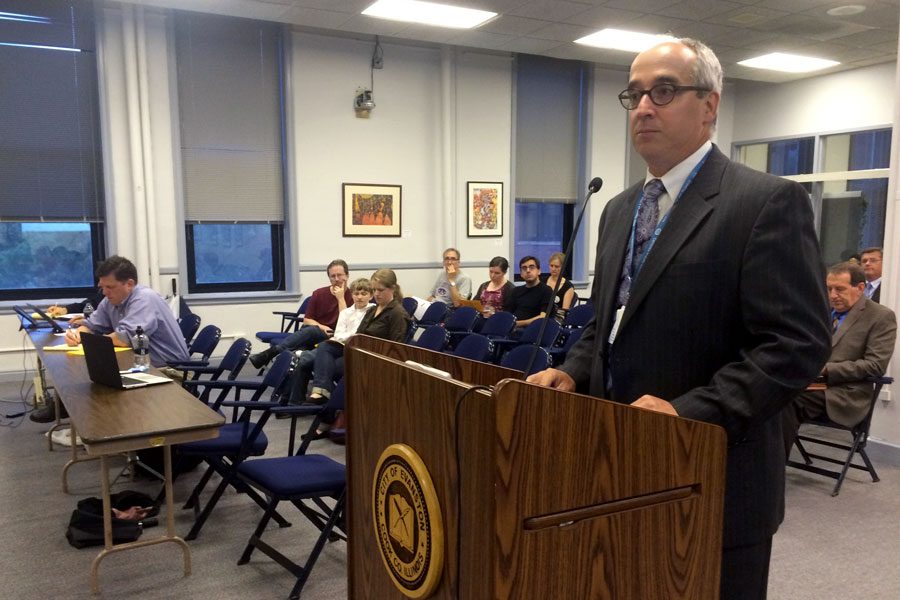Police, fire departments fight uphill battle for pension funds
Daily file photo by Julia Jacobs
Assistant city manager Marty Lyons speaks at a city meeting. Lyons said on Monday that the city’s police and fire pension funds are doing better than most.
October 12, 2016
It’s still a long road ahead to fully fund the city’s fire and police pension funds.
At an Administration and Public Works Committee meeting on Monday, aldermen heard a report on both pension plans, which are both funded at under 50 percent. An actuarial firm hired by the city suggested adjusting the mortality tables for the pension plans, which would cause the city’s contribution to increase.
Currently, the funded ratio for the fire plan is 43.6 percent and 46.6 percent for the police plan.
Jason Franken of the actuarial firm Foster and Foster said although the city’s contribution would be more than required by the Illinois pension code, it was a good decision for the city.
“The funding policy that … is being followed by the City of Evanston is much more sound than what’s in the Illinois pension code,” he said. “You’re meeting your obligations today rather than deferring it into the future when the money may or may not be available.”
According to city documents, if no change was made, the police pension fund would decrease, while the fire pension fund would increase in the long run. A change in the mortality tables, which calculate life expectancy, would result in an increase for both funds.
The previous mortality tables were calculated in the 1990s when life expectancy was lower, Franken said, and do not properly account for gender differences.
This year, both the assumed rate of return for salary contributions and investment rates were lower than expected. Police and fire pension funds across the state are hurting after decades of state and local policies of underfunding. A raise in property tax was recommended in the 2017 proposed budget to go towards the pension funds.
Evanston is doing better than most municipalities with pension funds, assistant city manager Marty Lyons said during Monday’s meeting.
Deron Daugherty of the firefighter’s pension board said the city requires patience to deal with the funds.
“This is a 30- to 35-year-old problem, and it’s going to take us 30 to 35 years to dig out of it,” he said. “It’s a pay now or pay later strategy.”
Daugherty said using the state’s pension recommendations would be like buying a “balloon mortgage” that wouldn’t go away. Such a contribution was necessary, he said.
“Our numbers are in line with reality,” Daugherty said. “This is always money that we owed; we just maybe didn’t know it yet.”
The actuarial fund will also work with the city in the coming weeks to prepare reports to look at the long-term plan for the police and fire pension funds in terms of the unfunded ratios and contribution requirements over the next 15 to 20 years, Franken said.
Focusing on the individual year, rather than the future, can make some cities lose focus on the long-term financial implications for the plan and the cities, Franken said.
Ald. Peter Braithwaite (2nd) said he supports making contributions to the pension funds now rather than in the future.
“So either pay now or pay later,” Braithwaite said. “One way or the other we’re going to pay.”
Email: norashelly2019@u.northwestern.edu
Twitter: @noracshelly


